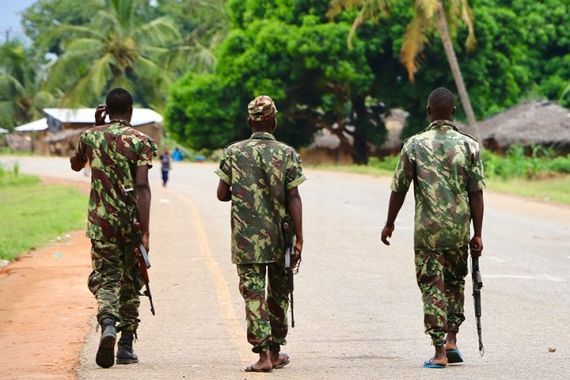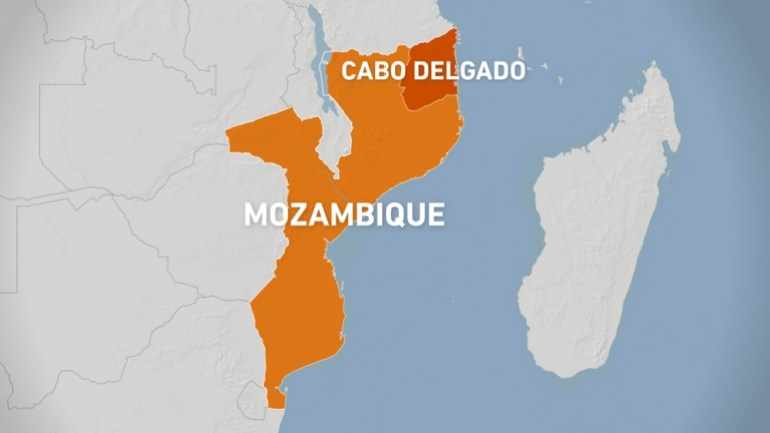Mozambique’s conflict and the question of foreign intervention
Attack on Palma has again increased pressure for more foreign military intervention, which Maputo has long resisted.

The bloody takeover late last month of Palma, a northern town at the centre of Mozambique’s vast oil and natural gas prospects, has again prompted international – and particularly regional – pressure to stem the violence.
Attacks by an armed group known locally as al-Shabab, whose origins, analysts say, are steeped in local political, religious and economic discontent, have steadily increased in the Cabo Delgado province since October 2017.
Keep reading
list of 3 itemsMozambique army says town attacked by fighters is now secure
Can Mozambique contain escalating violence?
The sophistication of the attacks has increased, too.
The ISIL-linked fighters have ransacked towns and gained control of key roadways. They have abducted young women and children and beheaded civilians. They have destroyed infrastructure and even expanded their sphere of operation north into neighbouring Tanzania. And since August 20, they have been in control of the key Mozambican port town of Mocimboa da Praia.
The worsening fighting has displaced some 700,000 people and killed more than 2,500. In early March, rights watchdog Amnesty International accused both the fighters and Mozambique’s security forces, as well as a South African private military firm hired by the government, of war crimes against civilians, including extrajudicial executions and acts of torture.
Eric Morier-Genoud, a professor at Queen’s University Belfast who focuses on Mozambican history and politics, said the attack on Palma – located next to Africa’s largest liquified natural gas construction site, where French energy giant Total has embarked on a $20bn project – has put “major pressure” on the Mozambican government to accept help from the Southern African Development Community (SADC) and Western powers.
“But the government of Mozambique is very sensitive in relation to its sovereignty,” Morier-Genoud told Al Jazeera. “It does not want foreign boots in Mozambique, and it wants to keep in control and in command of any other interventions, whether military or humanitarian.”
On Thursday, SADC, which is currently chaired by Mozambican President Filipe Nyusi, called for an “immediate technical deployment” to Mozambique following a special summit in the capital, Maputo.
Details of that deployment were not immediately released. However, the move is seen as indicating a slight shift in what has historically been, for the most part, a “security stalemate” between Mozambique and regional and Western governments.
“Where you have the host country [Mozambique] saying we want X, Y and Z, but we want it on our terms,” Dino Mahtani, the Africa deputy program director at International Crisis Group, explained. “[And other governments] saying, ‘Well, you’re not going to get that unless we have boots on the ground, or rather, you’re not going to get this unless we can mentor you and we can be closer and we can understand what it is that you want us to do with our equipment.'”

‘Testing the waters?’
Observers have long expressed concern that Mozambique’s security forces are ill-equipped to respond to the devolving situation, the genesis and perpetuation of which remains unclear. It is believed to be related, in part, to a local population that has not seen the benefits of the region’s natural resource boom, disputes among local elites and drug trafficking, and driven by the ISIL links.
Meanwhile, prior to the assault on Palma, in mid-March, the United States announced a small, two-month training mission of US Special Operations Forces “to support Mozambique’s efforts to prevent the spread of terrorism and violent extremism”.
The move came shortly after Mozambique accepted yet-to-begin training from former colonial power Portugal and following an uptick in visits to the country by Western officials in December, said Emilia Columbo, senior associate at the Africa Program at the Center for Strategic and International Studies.
“To see them agree to even this limited training from two individual partners is an encouraging step. It seemed like an admission that their security services weren’t up to the task, and that they would need a little bit of assistance in moving forward,” she told Al Jazeera.
“The question is, how much beyond that the Mozambican government be willing to go? Are they testing the waters?” she said. “If this goes well … will Mozambique be open to training for more units, or to have some other kinds of leadership training or consultation on developing a more comprehensive strategic approach?”
On Monday, US defence department spokesman John Kirby told reporters there are no plans for further US military involvement and there is “no request for support in that regard”.
Crisis Group’s Mahtani, meanwhile, called the US training mission “kind of a consolation prize” for both Washington and Maputo, giving the US an increased role in the country and Mozambique a leg up in security without larger foreign involvement.
“Nobody in the Mozambican government wants foreign boots trampling around Cabo Delgado as they argue it could only make things worse, just like foreign intervention in other parts of the world,” he said.
“The critics of the government, however, say that it is because they don’t want outside eyes on a part of the country that is a known epicentre for regional narco-trafficking, which regional counter narcotics sources say is connected to powerful interests”.
From the US perspective, he added, “if there’s an ISIS affiliated group running around, threatening major hydrocarbons infrastructure, why wouldn’t the US be interested in making sure that that is secure, given US policy has always been about ensuring free trade and a global energy equilibrium, stability, etc.”
‘Real dilemma’
The Palma attack left dozens of Mozambicans and foreigners dead, according to the government, which said earlier this week that it had secured the town after killing of a “significant” number of fighters.
But while the fighters’ assault further “elevated” the situation in Mozambique among the global community, it also created a “real dilemma” for the international community, said CSIS’s Columbo.
“We need to take into account how this conflict is perhaps now being perceived among jihadist circles, and to what degree has this conflict now become even more appealing to veteran fighters that are looking for a new gig,” she said.
Academic Morier-Genoud added that “most commentators agree that a foreign intervention would be a gift to the local fighters and to ISIS, who could present the conflict as part of a global war against the ‘infidels'”.
However, leaving the fight completely to Mozambique whose “security services do not have the wherewithal to really manage this conflict, especially as it has grown” is also not a viable option, Columbo argued. She pointed to the fighting receiving increased attention from Western leaders and legislators, as well as to regional governments, some whose citizens were directly affected by the most recent attack, facing grassroots pressure to act.
The solution, she said, may be more of these “small-scale, under the radar, training exercises”.
“It has to be done in such a way that it doesn’t make it worse and I think that’s it’s a real dilemma, it’s a very delicate situation for would-be partners to navigate,” she said.
‘Foreign terrorist’ designation
Some analysts have also suggested that the government’s emphasis on al-Shabab in Mozambique’s links to ISIL is part of a larger effort to portray the violence as fuelled by external forces, and to de-emphasise the role of local drivers.
While the group has pledged allegiance to ISIL as early as 2018, and there is evidence of at least a few foreign fighters joining its ranks, the extent of coordination remains largely unknown, according to analysts.
Since June 2020, Mozambican authorities have openly referred to the violence as “terrorism”, previously calling it “criminal banditry”.
Meanwhile, in March of 2020, the US designated what it calls the Islamic State of Iraq and Syria-Mozambique (ISIS-Mozambique) as a “foreign terrorist organization” and its leader, Abu Yasir Hassan, a “specially designated global terrorist”.
The designation, which among other provisions bans Americans from engaging in transactions with the group, has been criticised by some. In a March report, CSIS noted the label “risks impeding humanitarian efforts and hobbling potential disarmament, demobilisation, and reintegration (DDR) activities”.
The analysts also noted that Mozambique may view the designation as an “affirmation of its narrative of an externally fomented conflict”.
“Mozambican officials last year started to stress the conflict’s external dimension, presumably seeking to deflect any blame for the region’s disaffection and mismanaging of the security response,” they wrote.
“A continued focus on a military campaign at the expense of social and economic programs to foster greater development and stability will likely prolong the conflict.”